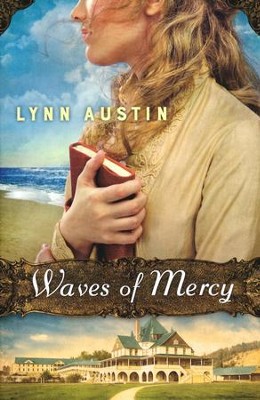 In 1897, Geesje de Jonge is asked to write a memoir about her experience
emigrating from the Netherlands to Michigan. As Geesje recalls the
events of her past---including the story of her one true love---a young
visitor named Anna mourns a broken engagement. What life-altering
surprises await the two women before the summer ends?
In 1897, Geesje de Jonge is asked to write a memoir about her experience
emigrating from the Netherlands to Michigan. As Geesje recalls the
events of her past---including the story of her one true love---a young
visitor named Anna mourns a broken engagement. What life-altering
surprises await the two women before the summer ends?I know a number of people who don't read fiction. Why waste time on stories when you can be learning more about God through the bible and nonfiction? And they read highly reputable, good works to get to know God better. But for me, of all the books I've read, it's fiction that touches me the most, and what God uses to speak to me. And He had a lot to say through this book.
To be honest, though I enjoyed the story (or stories--both Geesje's and Anna's and how they so beautifully tied together), it's far from my favorite of the author's works. It's much more real-life-ish than romance-novel-ish. Yet even so, I can't deny that it has some powerful things to say; things that I needed to hear and do.
Geesje's work recounting her life--her struggles--is a way she could look back and see how her faith has grown, even through the incredible trials in her life. And even though I fully intend to live another 60-70 years, I felt compelled to do the same (which interrupted my reading, but better to strike while the iron's hot than chicken out later), simply putting my testimony into words on paper. It reminded me of the book of Deuteronomy, when the Israelites recount their journey of the exodus to the Promised Land and all the milestones--both good and bad--along the way. Then they place stones of remembrance in the Jordan before setting off into the new land. This story is Geesje's stone of remembrance.
There is so much one can take home from this novel, about faith, about true love, about the choices we make. Though Geesje's story shows the maturation of her faith, I love her interpretation of it: "It has more to do with God's faithfulness to me than the other way around." Isn't that how it is? God is truly the faithful one in the relationship, not us.
One small thing--I'm not a big fan of present tense stories. Anna and old Geesje (in 1897) have their point of view in the present tense, while Geesje's history is told in the past tense, making it easy to differentiate what year one is reading about. It works, but I still don't love the present tense.
Thank you Bethany House for providing an e-book to review; I was not required to make the review positive, and all opinions are my own.
No comments:
Post a Comment